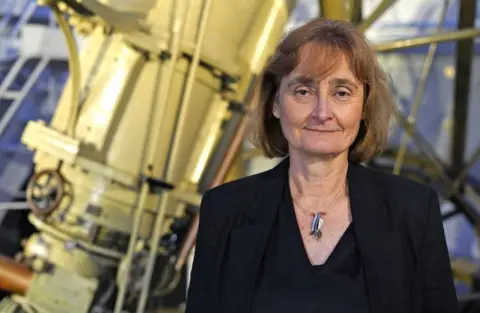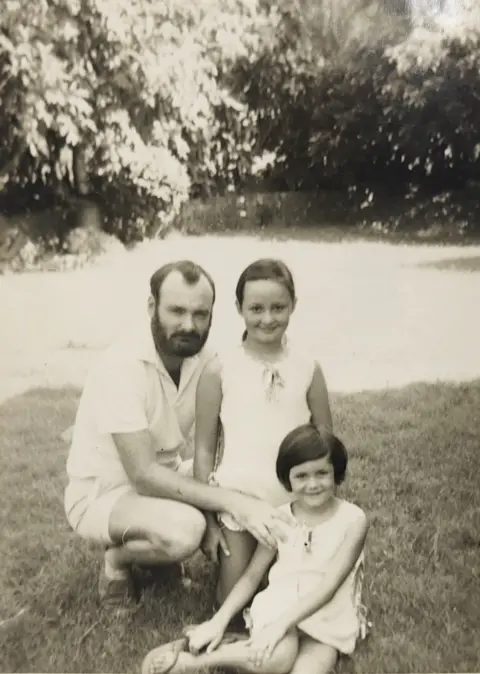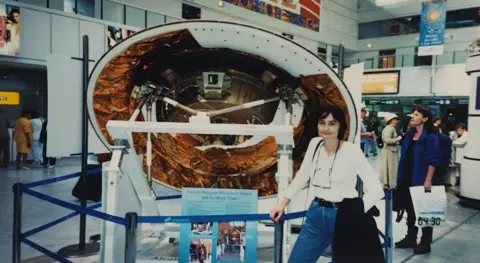Science Videographer
 Amanda Clark/Cabinet Office
Amanda Clark/Cabinet OfficeAstronomer Prof Michele Dougherty did not study science in secondary school – but was instead inspired to learn more about space after using her father’s telescope.
Now she is the first woman to be appointed the UK’s Astronomer Royal in the post’s 350-year history, and is part of the team sending probes to Jupiter’s icy moons.
She told BBC News she hoped her appointment on Wednesday as the official adviser to King Charles III on astronomical matters would inspire more women and girls to study science.
The new Astronomer Royal added that she also wanted to use her new role to “open people’s eyes” to the wonders of space.
“I want to engage with the public, excite them about what we do in astronomy, but also make it clear how important what we do is to the UK economy,” Prof Dougherty said.
Prof Docherty is involved in one of the most exciting space missions to date: a European Space Agency probe to the icy moons of Jupiter to assess whether they have the potential to support life.
“It would be surprising if there wasn’t life in our solar system,” she said laughing, with the unbridled enthusiasm she is known for.
Her journey to Jupiter began when she was ten at the age of ten and saw the planet through a telescope she, her sister and her father built.
“That was when I got my first view of Jupiter and four large moons, never thinking I’d end up sending instruments on a spacecraft there,” she said.
“I’m having to pinch myself at the thought of it and I’m having to pinch myself at the fact that I’m now Astronomer Royal!”
Prof Dougherty’s achievement is all the more remarkable as she did not study science at secondary school in South Africa where she grew up.
“I had a choice between schools. One of them taught science, but none of my friends were going to it,” she said. “So as a young 13 year-old, I thought, I want to go with my friends.”
But the young Prof Dougherty was so good at maths that she was admitted to a science course at university.
“The first couple of years were hard. It was like learning a new language,” she said.
But she soon caught up and came to the UK to become one of the country’s leading space scientists, showing tremendous courage as well as talent.
“I said yes to things I didn’t know how to do, and I learned as I went,” she told me.
 Michele Dougherty
Michele DoughertyThe role of Astronomer Royal dates back to the creation of the Royal Observatory in Greenwich in 1675. John Flamsteed from Derby was the first person to fill the role. The job back then was mostly to advise the king on using the stars to improve navigation at sea.
The observatory’s senior curator, Dr Louise Devoy, explained that the job evolved over the years, to become one of the most important scientific voices in the country.
“By the 1800s the Astronomer Royal started to be called upon to act as a government advisor, so that may be to advise on the railways or bridges or telegraphy, a whole range of topics beyond astronomy,” she said.
“If we fast forward to the 20th Century, it is more about developing international collaborations, which is why you have British astronomers working in telescopes in Chile, the Canary Islands and even the James Webb Space Telescope.”
Over three and a half centuries,15 men have held the post of the most senior astronomer for all of the UK. But at the Royal Observatory in Edinburgh, Prof Catherine Heyman has held an equivalent post as Astronomer Royal for Scotland since 2021.
She was delighted to hear of Prof Dougherty’s appointment.
“For the last 350 years the title of Astronomer Royal has been held by a white male astronomer, and that kind of reflected what the astronomical community has looked like for the last few centuries. But things are changing,” she said.
“Science is becoming more diverse, which it needs to be if we want to answer these big questions, and I’m absolutely delighted now that the two Astronomers Royal across the UK are female, reflecting the fact that science is for everyone.”
 Michele Dougherty
Michele DoughertyProf Dougherty herself does not want to make a big deal of the fact that she is the first woman to hold the UK-wide post, but she hopes it will inspire others to follow in her footsteps.
“I think it is important. I think when young children in particular see someone that looks like them doing a job they think they would never get an opportunity to do, it changes their mindset a little,” she told BBC News.
Prof Dougherty experienced this when she was head of the physics department at Imperial College between 2018 and 2024. During that time, the percentage of first year female undergraduates who came to Imperial increased from about 19% to 25%.
“Not a huge change,” she said, “but there was a positive change. And I think it’s because students saw that I was in a role that they might aspire to in the future”.




